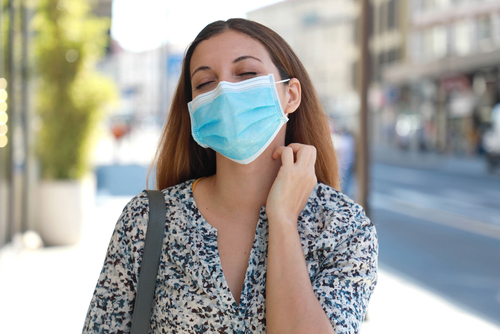
The brain has powerful effects on the body, and prolonged stress, anxiety, and other factors can manifest in an unpleasant stress reaction. Add to that preexisting skin conditions, and you have the recipe for a potentially severe and uncomfortable skin flare-up.
Everyone is different, so the impact, level of irritation, and treatment routines can vary depending on life and personal circumstances. The COVID-19 pandemic, in particular, has put the entire world on edge. Some of that stress is undoubtedly making its way into your daily life in some unpleasant ways.
While stress-related skin disorders may seem severe, there are multiple ways to deal with them. Let's learn more about stress rashes, then see which is the best treatment for them.
What is a Stress Rash?
A stress rash is simply a rash or issue with the skin caused by stress and anxiety.
A typical stress rash reaction is breaking out in hives, known as urticaria. These are raised, itchy bumps that appear on the infected area and can appear anywhere on the body. Along with hives, those with existing skin conditions, like eczema and rosacea, can experience more frequent flare-ups. Stress rashes are widespread, affecting millions in the United States annually.
How does it work? When cortisol levels increase in response to stress, your body's histamine response goes into action, manifesting as puffy skin, inflammation, and overall increased oil production. This oil, for example, can cause severe acne outbreaks.
Does Stress Cause Hives?
Yes, and hives are one of the most prevalent stress reactions.
These puffy, raised welts can vary significantly in size, shape, and itchiness. Those with hives usually only experience them for less than 24 hours and go away on their own. You can use over-the-counter antihistamines to reduce itchiness, puffiness, and the overall discomfort of an outbreak.
Hives also trigger due to reactions to a specific medication, food, and other allergens, so it’s recommended to see your doctor for a diagnosis.
Condition Flare-Ups
These conditions are exacerbated by stress if you already experience regularly unpleasant outbreaks from eczema, rosacea, and acne. Stress can trigger flare-ups for other medical conditions like Crohn's disease, ulcerative colitis, and fibromyalgia.
How to Treat a Stress Rash
Thankfully, many stress rashes, hives, and the like can benefit from home treatment. Hives and other rashes usually last only a few days and are overall mild outbreaks. Depending on the severity and longevity of the outbreak, you may want to seek help to ease your symptoms in addition to your anxiety.
Antihistamines
Antihistamines are the most effective way to alleviate stress rashes. You can find many over-the-counter antihistamines. These relieve uncomfortable symptoms like itching and inflammation. If you have a terrible case of hives, you may want to invest in antihistamines just to decrease discomfort.
If your reaction is stronger, then a doctor may recommend a course of treatment involving more potent antihistamines and steroids.
There are two main types of antihistamines: topical and oral. Depending on the severity of your stress rash or hives, topical antihistamines may not be potent enough to relieve your symptoms. That’s where taking an oral antihistamine, like Allegra, Claritin, and Benadryl, can relieve itchiness and discomfort.
Antihistamines are also effective tools when managing spring allergies.
Stronger Medicine
While stress rashes can clear up on their own, some people may experience more severe outbreak symptoms that need a more potent remedy. The impact of a skin outbreak can be severe enough to warrant the use of a steroid regimen.
Whether it is prescription creams or antihistamines, you can quickly get in contact with our specialists. We can help you determine the best course of treatment for your particular outbreak.
When to Seek Treatment for Outbreaks
Aside from treating your skin with antihistamines, sometimes the discomfort and impact of hives or other rashes can be too much to bear. If you have trouble sleeping, undertaking your daily routine, or develop additional conditions like scabs and fever, contact your doctor for examination and treatment.
Stress Relief Techniques
Going forward, it's essential to recognize your triggers regarding outbreaks.
Was it because you're overworked? Feeling the prolonged effects of the pandemic in all its forms? Acquiring and practicing new, healthy techniques may be able to help you reduce flare-ups and eradicate stress rashes.
Practicing different mindfulness and stress relief techniques can make a considerable difference in your life. These may not come with a prescription pad, but they can go a long way toward improving your quality of life.
For example, reducing excess screen time, going on regular walks, and focusing on breathing can be invaluable stress management techniques.
These techniques take time and practice, so anxiety and stress aren't likely to disappear overnight. However, they help combat and eradicate stress-related skin issues and your comfort level. They’re also effective ways to improve your overall health.
Final Thoughts on Stress Rashes
Stress is one of the most dangerous factors of our everyday lives. However, with stress management techniques, antihistamines, doctor visits, and recognizing triggers, you can go a long way towards eliminating stress-related skin disorders.
If you're experiencing regular stress rashes or other skin flare-ups, explore our dermatology department. Our doctors can help get rid of hives and other skin-related conditions.
At Summit Health, our dermatology specialists treat conditions like itching, hives, acne, rashes, eczema, aging skin, and photodamage. And be sure to explore our allergy and immunology department if your rashes are also reactions to certain foods, medicine, or other triggers.
